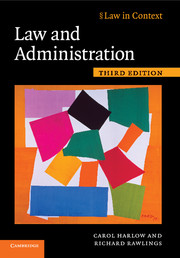Book contents
- Frontmatter
- Contents
- Preface
- Table of Cases
- Table of Statutes
- 1 Red and green light theories
- 2 The changing state
- 3 Transforming judicial review
- 4 Making the law
- 5 Rules and discretion
- 6 Regulation and governance
- 7 Regulatory design and accountability
- 8 Contractual revolution
- 9 Contract, contract, contract
- 10 Into the jungle: Complaints, grievances and disputes
- 11 Tribunals in transition
- 12 The Parliamentary Ombudsman: Firefighter or fire-watcher?
- 13 Inquiries: A costly placebo?
- 14 Continuity and change: Procedural review
- 15 Elite dimension: Court structures and process
- 16 Judicial review and administration: A tangled web
- 17 ‘Golden handshakes’: Liability and compensation
- Index
10 - Into the jungle: Complaints, grievances and disputes
Published online by Cambridge University Press: 05 June 2012
- Frontmatter
- Contents
- Preface
- Table of Cases
- Table of Statutes
- 1 Red and green light theories
- 2 The changing state
- 3 Transforming judicial review
- 4 Making the law
- 5 Rules and discretion
- 6 Regulation and governance
- 7 Regulatory design and accountability
- 8 Contractual revolution
- 9 Contract, contract, contract
- 10 Into the jungle: Complaints, grievances and disputes
- 11 Tribunals in transition
- 12 The Parliamentary Ombudsman: Firefighter or fire-watcher?
- 13 Inquiries: A costly placebo?
- 14 Continuity and change: Procedural review
- 15 Elite dimension: Court structures and process
- 16 Judicial review and administration: A tangled web
- 17 ‘Golden handshakes’: Liability and compensation
- Index
Summary
Informal justice
Origins
Much of the energy of modern administrative law has been spent on alternative dispute resolution (ADR). Alternative to what? In the course of the next chapters, we shall see that this question can have several answers. We could be talking of inquisitorial alternatives to adversarial procedure; of documentary procedure as alternative to oral hearings; of internal review as alternative to tribunals; of inquiries as alternative to ministerial appeals (such as we find in the education and planning systems); of arbitration and mediation instead of litigation. There is a natural tendency, however, for administrative lawyers to think in terms of tribunals as alternatives to courts. This is, as we shall see, how the debate has evolved.
A famous nineteenth-century aphorism described justice ‘like the Ritz hotel’, as open to rich and poor, marking a growing concern over what would we should today call the ‘access to justice’ problem. The simile was a telling one. Litigation, even in essential areas, was quite simply beyond the means of the majority of the population. Legal services for the poor were exceptional. In criminal law there were ‘poor person's defences’ but even this provision was not formalised until the twentieth century. In civil cases, unpaid legal assistance was virtually restricted to charitable provision and the ‘pro bono’ activities of the legal profession. Despite patchy efforts at reform, this situation did not change materially until the introduction of the Legal Aid and Advice Act 1949. A period of relative generosity in the provision of legal aid ensued only to be followed by a serious turndown since 1990.
- Type
- Chapter
- Information
- Law and Administration , pp. 437 - 485Publisher: Cambridge University PressPrint publication year: 2009



